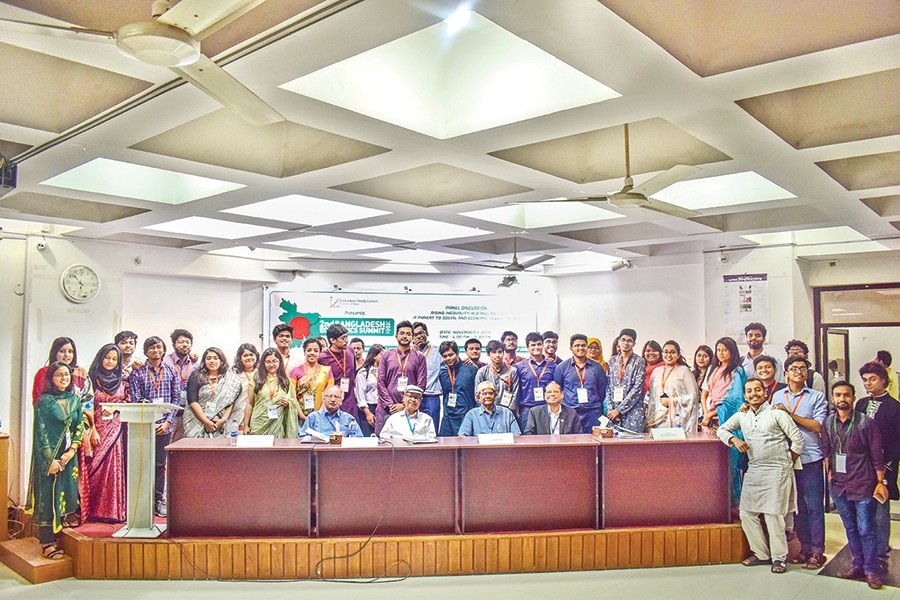Economics Study Center (ESC), University of Dhaka organised the second Bangladesh Economics Summit under the theme "Inclusive growth and sustainable livelihood: In Bangladesh Perspective". The three-day event hosted multiple segments including research paper competition, essay competition, policy debate and panel discussions.
With an aim to promote the participation of youths in economic research and policymaking, the summit commenced on October 31 in Muzaffar Ahmed Chowdhury Auditorium, University of Dhaka. Special guest of the opening ceremony, Professor Dr Shafique-uz-Zaman, chairman, Department of Economics, University of Dhaka praised ESC for its tremendous growth since its inception in 1973. Chief guest KAS Murshid, director general, Bangladesh Institute of Development Studies (BIDS) said to students, "If you are curious about things, you have the courage, you want to be bold and make a statement, you should go into research."
The first panel discussion 'Ensuring quality education: Challenges and way forward' was chaired by Professor Dr Firdousi Naher, Department of Economics, University of Dhaka on November 01. All three panelists - Chowdhury Mufad Ahmed, senior education adviser, UNICEF, Bangladesh, Maimuna Ahmad, founder and CEO, Teach for Bangladesh and Dr Mohammad Tanzimuddin Khan, professor, International Relations, University of Dhaka agreed that the problem in Bangladesh education system lies in the primary level's failure to attract quality teachers. Dr Mohammad Tanzimuddin said the country should focus less on increasing the number of universities and more on producing graduates with critical thinking abilities.
The topic for the second panel discussion was "Healthcare in Bangladesh: How can we achieve affordability and accessibility?" Chaired by Professor Dr Shahadat Hossain Siddiquee, Department of Economics, University of Dhaka, the panelists were Dr Rashid-E-Mahbub, chairman of National Health Rights Movement Committee, Dr Syed Abdul Hamid, professor, Institute of Health Economics, University of Dhaka, and Professor Dr Md Iqbal Kabir, director of Planning and Research, Directorate General of Health Services (DGHS). Lack of health insurance coverage, urban-rural divide, and digitalisation of healthcare were few of the many issues raised by them.
In the panel discussion titled 'Promoting women's economic empowerment in Bangladesh: Challenges and opportunities', the session chair Professor Dr Sadeka Halim, dean, Faculty of Social Sciences, University of Dhaka deliberated on the need to free ourselves off the patriarchal views dictating a woman's life.
"Women have proved they can handle micro finance,'' said Habibur Rahman, consultant for Equality and Youth Empowerment Programme, Yukta while explaining how development organisations are trying to mobilise women in the agriculture sector. Panelists Dr Sayema Haque Bidisha, professor, Department of Economics, University of Dhaka and Umme Salma, gender adviser, Save the Children remarked that the government should provide good hostels, daycare facilities, and harassment-free work environment to remove the obstacles hindering female labour supply.
The day ended with a panel discussion "Rising inequality in Bangladesh: A threat to social and economic development?" where session chair Dr MM Akash stated "Inequality reduction is now a socially desirable programme". Panelist Professor Dr Mustafizur Rahman, distinguished fellow of Centre for Policy Dialogue (CPD), described the problem as complex and multifaceted. Using examples, he explained that many countries with relatively low inequality are growing faster because "domestic demand creates further stimuli for growth". Dr Mustafa K Mujeri, executive director, Institute for Inclusive Finance and Development, believes segregation in the labour market is contributing towards inequality and that society is the most unequal state since independence.
Another panelist, Dr Salehuddin Ahmed was worried that the "grow first, distribute later" policy is stifling the creativity of those suffering from inequality. "Eruption is a reflection of social discontent," said the former governor of Bangladesh Bank, adding country's decision-making process is slowly leading people to it. The final day of the event began with the research paper presentation competition held in Sirajul Islam Lecture Hall where undergraduate students from various universities presented their papers relevant to the theme of BES 2019. A policy debate took place on the motion "This house believes that the economic future of the people of Bangladesh is uncertain".
In the discussion on "Promoting youth entrepreneurship and skills development for decent Job Creation" chaired by Dr Sayema Haque Bidisha, the panelists were Dr Fahmida Khatun, executive director, CPD, Tanvir Haider Chowdhury, CEO, Kazi Food Industries Limited, M Masud Rana, deputy managing director of BRAC Bank Limited and Munir Hasan, head of youth programme, Prothom Alo. The final panel discussion was on "Good governance and accountable institutions for sustainable development". The session chair, Professor Dr Selim Raihan, executive director at SANEM, mentioned that Bangladesh is facing three types of policy paralysis - tax paralysis, monetary paralysis, and education and health paralysis. "Bangladesh is inching towards de facto one-party rule." said Dr Mirza M Hassan, senior research fellow, BRAC Institute of Governance and Development. The panel was shared by Dr Ahsan H Mansur, executive director at Policy Research Institute and Dr MM Akash.
"When it comes to any of the public service delivery mechanism, everybody is looking after the ones in power, nobody cares about the regular people," said Dr Ahsan H. Mansur. Dr MM Akash highlighted the need for a nationalist force that believes in "not earning something without working for it."
"No one can contain us if we think," said chief guest Dr Hossain Zillur Rahman, chairperson, BRAC Bangladesh and executive chairperson, PPRC at the closing ceremony of BES 2019.
The winner of the essay competition Ihtesham Hassan, champions of the paper presentation competition Farhin Islam and Anuva Afsana, and runners-up Tanjim-Ul-Islam received their awards. The President Tahmid Hasan and General Secretary Rafiul M Chowdhury of ESC concluded by inviting students to engage in discourse as it essential for good governance and sustainable growth in Bangladesh.
The writer is a second year student at Department of Economics in University of Dhaka. She can be reached at [email protected]


